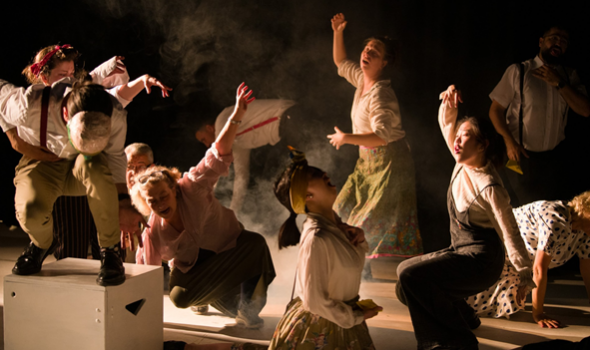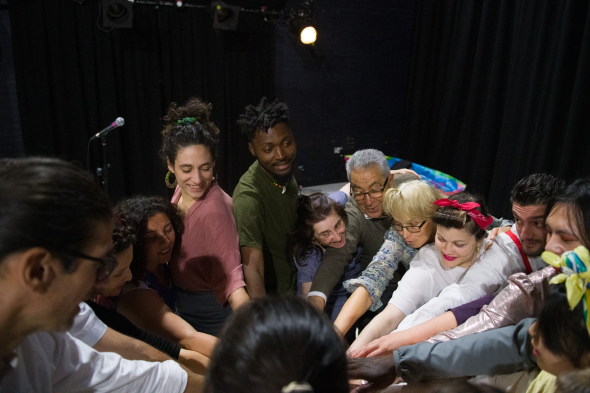Getting in on the act
Getting in on the act

Through theatre, migrants can become active storytellers, actors, directors, shaping the narratives that define them.
Two theatrical pioneers reflect on their visions for putting migrants and migration on stage.
Lara Parmiani, founder/artistic director, Legal Aliens
I moved to the UK from Italy in the late ‘90s, where unemployment was sky-high, and misogyny rife. From the outside, the UK looked open, international, and multicultural, so I assumed theatre would be the same. But the reality was different.
British theatre hardly reflects its diverse communities. And although things have slowly improved for British artists of migrant descent — although women of colour, for instance, are still massively underrepresented, especially in positions of leadership — the industry is still ignoring first-generation migrants. It's like we don't exist.
Migrants on stage are either portrayed as funny foreigners, a series of cliches with comedic accents, or as powerless victims.
Very rarely stories about migrants, foreign countries or events that happened outside Britain were written, directed and performed by people with direct experience. There is always a "British gaze" that everything is filtered through.
For years I knocked on theatres' doors. I would get small jobs but I felt like an eternal beginner. So I took matters into my own hands and started a company of migrant artists, to create theatre that speaks about migration and could bring a different approach to storytelling.
Having migrant and refugee bodies on stage is itself a political act.
Yes, we have accents. Yes, we use a style of theatre that might be different. Come and experience it. For me, it wasn't just about the artists. It was also about migrant and refugee communities. These demographics hardly ever go to the theatre. They think it's too expensive, too posh, with too much text they might not understand.
Many companies run "workshops" for migrants and refugees as part of their projects. But disenfranchised individuals, people who maybe have gone through trauma, feel lonely and lost, don't just turn up for a weekend class.
So we created a regular weekly space open to anyone identifying as a migrant. We are always there. And we are migrants like them. They can get to know and trust us. Some develop such a passion that they never stop coming. Some have joined our facilitators team. This has been a great joy.
I am proud we have been pioneers. When we started in 2012, nobody talked about "migrant theatre". Nobody understood what we were doing.
Our first show puzzled people. It was an Italian play in translation, about a working-class family in Bergamo. Industry people and critics didn't understand why everyone in the cast was Italian. Why didn't you set it in Sheffield and cast Northern actors? It would be more accessible! Yes, I could have done so and "adapted" to a familiar environment, but what is the point of taking a story from somewhere else only to turn it into a British story?
Audiences loved it. They said they felt transported somewhere else. I am really proud how many people, from demographics who would never traditionally go to the theatre, come to our shows; the enthusiasm at finally seeing their voices, their point of view, represented.
Slowly the industry has started to take notice. People have stopped asking me why there should be migrants in British theatre.
+ 2025: free weekly classes for refugees and migrants in north London continue into their sixth year. Its most recent production, Tugging At The Sea, a parody about the current obsession with boats, will be staged again; an international co-production, The Flowers of Srebrenica, will open in Sarajevo in July and a UK tour is planned for later in the year. The cast have direct experience of war and/or displacement in Bosnia, Rwanda, Sudan, Syria and Ukraine.

Christine Bacon, co-artistic director, ice&fire
Two audience responses:
- “I saw the Asylum Monologues over a year ago now. It completely stirred me. As a result, I got involved with Sheffield Conversation Club, and even wound up welcoming a sweet woman from Uganda into our home, who has now become one of our dearest friends.”
- “I had spent years telling a certain person about what was going on in our country, without any success whatsoever. But after attending just one performance her attitude changed to such an extent that she too is now spreading the word. Until seeing and hearing these stories for herself she would not believe what is going on."
ice&fire was set up in 2003 by playwright Sonja Linden who had spent several years volunteering as a writer-in-residence at Freedom from Torture. Inspired by her friendship with a woman who had been through the UK's asylum process, she wanted to use theatre to engage, educate and activate British audiences about the deficiencies of the UK’s asylum and immigration system and the human impact of forced migration.
We have expanded to embrace a broader human rights focus but a large part of our core work has remained connected to the original mission through our Actors for Human Rights project, a network of professional actors who perform rehearsed readings to audiences across the UK. The scripts are made up of first-hand accounts of people who have been deeply impacted by the UK's immigration and asylum laws and policies.
Taking our work to British audiences, we have consistently been met with responses which demonstrate that many of the truths of the issues we raise have been hidden or deliberately obscured from the public. Even in 2024, audiences are still shocked to hear we have immigration detention centres, or that asylum seekers are prevented from working, how restrictive the immigration rules are and how exorbitant the visa fees are.
Actors for Human Rights performances have been seen by over 120,000 people. After each performance we facilitate a discussion with the audience and local campaigners and supporters, focussing on engaging audiences in ways they can get involved.
With the harsh and dehumanising media coverage of the Channel crossings and the continued scapegoating of immigrants in general, the mission of challenging attitudes and creating a powerful space for lived experience to be heard remains as important now as when it started, if not even more so.
+ 2025: continuation of podcast series, 'I am an Immigrant'; production of a new presentation, Papers, which looks at punitive immigration rules, such as the 10-year route to settlement; our annual Queer Migrant Pride Festival.
Photo credit: Legal aliens photo (top): Kuan Jin Chou


